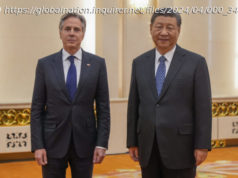TOKYO (AP) — Two teams, from two Chinese cities, confronting each other on a badminton court, thwacking the shuttlecock back and forth. Nothing unusual there.
TOKYO (AP) — Two teams, from two Chinese cities, confronting each other on a badminton court, thwacking the shuttlecock back and forth. Nothing unusual there. In China, teams play each other all the time. For the mixed doubles pairing from Beijing that emerged victorious, the match this week had the banality of any other domestic competition. “Because we know each other so well,” said the woman on the winning team, Huang Yaqiong. “There’s nothing different.” Except this was an Olympic semifinal at the Tokyo Games. And for China, the rare privilege of being able to field two distinct teams — one from the Chinese mainland, in bright communist red, the other from its city of Hong Kong, in a royal blue — was essentially giving it two bites at the Olympic cherry. That’s two routes to securing another of those shiny Olympic gold medals that China’s communist leaders so crave as proof they are doing a sterling job. China’s double-teaming of the Olympics — the equivalent, say, of the United States fielding both a national team and another of athletes solely from New York — has never been much of an issue at the Olympics and isn’t becoming one so far in Tokyo. But two things are happening that could weigh on the equation. First, Hong Kong is winning, like never before. Tokyo is the most successful games ever for the city of 7.5 million people on the south China coast. A gold medal in the men’s foil event for fencer Cheung Ka Long was Hong Kong’s first since the one-time British colony was reabsorbed by China in 1997. Cheung was born just 20 days before that momentous change in the city’s trajectory. When windsurfer Lee Lai Shan won Hong Kong’s first and only previous gold, at the Atlanta Games in 1996, “God Save the Queen” played at the medal ceremony. In Tokyo, for Cheung, it was China’s anthem, “March of the Volunteers.” Swimmer Siobhan Haughey, born in Hong Kong four months after the 1997 handover, also has two silver medals from Tokyo, becoming the city’s first multiple medalist. Their combined haul of treasure outshines the one gold, one silver and one bronze that Hong Kong had accumulated through all of its previous appearances since its Olympic debut in 1952. But such success also begs a question: Is it fair that China — with one team labeled China and the other Hong Kong, China — is getting multiple pathways to Olympic podiums? Should Hong Kong athletes instead be folded into China’s national team — as, for example, athletes from Scotland, Wales and some from Northern Ireland are in Team Great Britain with the English? One could even argue that China is extra-privileged by having three teams at the Games, if one accepts Beijing’s position that the island of Taiwan is also part of its territory.






